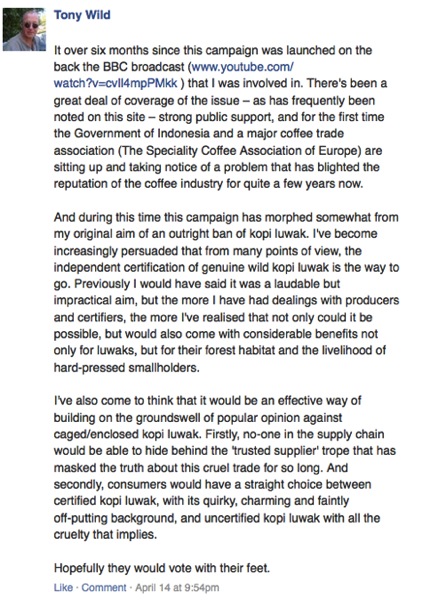By Xu Weiting
Planning a vacation soon? Want to have an enjoyable trip without unknowingly supporting attractions with wildlife-cruelty practices? World Animal Protection (WAP) at the start of 2016, started its campaign on “Wildlife, not entertainers”, where wildlife entertainment attractions are evaluated based on
- the level of animal welfare given to the animals in their care &
- their contribution towards improving the animal’s conservation status
Visiting civet coffee plantations made it to the list as one of the top ten cruellest tourist attractions. As a follow up to this, WAP released a 36 page report on “Checking out of cruelty“. This report is the findings from a commissioned research study done by the University of Oxford Wildlife Conservation Research Unit (WildCRU). In the report, the origins of kopi luwak and how it evolved to be a damaging trade to civets is succinctly explained –
“A single cup of civet coffee or Kopi Luwak, fetches up to $100. Civets love to eat coffee cherries and Kopi Luwak coffee is made from the beans within the cherries that the civets excrete in pellets.
When the pellets are collected from civets in the wild, no cruelty is involved. But in an attempt to produce more civet coffee, farmers have started catching the civets and keeping them in small, crowded barren cages. Caged civets are encouraged to gorge on an unbalanced diet of coffee cherries.
This unnatural captivity and forced feeding results in injuries, disease and poor nutrition. Many show signs of great stress, including pacing and self-mutilation.
There is now a growing civet coffee plantation tourism industry in Indonesia where tourists visit caged civet cats and sample the coffee. This is causing more and more civets to be caged and abused.”
Exercise your choice to not visit these attractions and purchase products that exploit wild animals for profits. When planning your holiday, do remember that wildlife should best be appreciated in their natural wild habitats and not as entertainment.
For more articles reporting on the WAP news release:
- Rainey, C. 2016, 22 Mar. World’s Most Expensive Coffee Requires Actual Animal Torture. Grub Street.
- Snowdon, K. 2016, 02 Feb. Wildlife Tourism: The 10 ‘Cruelest’ Animal Attractions, Revealed by World Animal Protection. Huffington Post UK.
- Topsfield, J. & A. Rosa. 2016, 15 Apr. Famous faeces: the story behind the civet-poo coffee craze. The Sydney Morning Herald, World.
